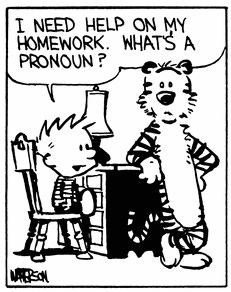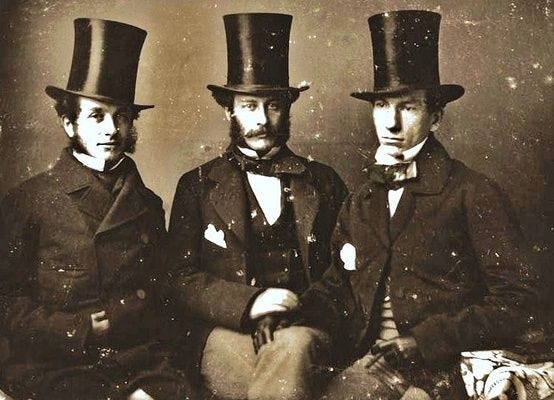Hard to believe this ‘Clavin and Hobbes’ comic strip celebrates a 35th birthday today.
Time does indeed fly. Scouring the records, and apologies to the Polish and Canadian contingents of readers, of all the many, many important humans born on 24th February 1986, the only person who made the lists of being ‘really’ important was the Polish-Canadian ice hockey star, Wojtek Wolski. Some notable other births on 24th February include Steve Jobs in 1955, and very little else. The historical archives are blank and nothing of significance happened on 24th February 1986 either. Reading further back through the 24th February archives, the US Ice Hockey team won the gold medal at the 1980 Winter Olympics. Further back in 1949, Juan Perón’s first President of Argentina election win occurred. Even further back, in 1303, the English armies lost to the Scottish armies at the Battle of Roslin, in the First War of Scottish Independence. 24th February is a relative dud in the annals of history, but 1986 included many interesting events and births.
'Calvin and Hobbes’ has aged well. Times have changed, and pronouns today have jumped to the forefront of people’s thinking. To help Calvin out, pronouns are:
one of a class of words that serves to replace a noun phrase that has already been or is about to be mentioned in the sentence or context.
For example:
Does this iPhone belong to Sheila? No, it’s mine.
Two pronouns: one is ‘it’ (replacing the word ‘iPhone’) and the possessive pronoun ‘mine’.
Remember audience, humans tend to lazy. The Alpha Predator has reached the top of the food chain and now enjoys an eternal sunset G&T whilst kicked back, grazing on snacks and watching the world pass by… on Netflix. The world does not need pronouns. Check again the definition above - or go check another definition if the dear reader needs more convincing. In every case, the definition will refer to a pronoun replacing a noun. If good noun exists, why use a replacement word? Lazy, right?
Pronouns ensure humans remain lazy. If a person forgets a name, then rather than use a pronoun, remember the person’s name. People forget, but methods exist to train the brain to keep information for longer. Instead of being lazy and sedentary, train the little grey cells for peak performance. Otherwise, apologise for the loss of memory and ask for the person’s name again. Admit failings.
The training may be a struggle. Listed as one of the eight parts of speech by the Greeks in the treatise ‘The Art of Grammar’ (attributed to Dionysius Thrax), pronouns have existed for grammatical efficiency since the 2nd century BC. The word pronoun has been part of the English language since the mid-15th century. Pronouns have existed earlier than the documented first use of the word pronoun. The 14th century poet and author, Geoffrey Chaucer, used pronouns. Chaucer was also free wheeling with the singular use of ‘they’. A well quoted line from The Canterbury Tales:
And whoso fyndeth hym out of swich blame,
They wol come up…
‘[W]hoso’ is Middle English for today’s ‘whoever’. This is a singular expression. ‘They’ is therefore a singular pronoun. Writers ever since have been using ‘they’ as a singular pronoun from Lewis Carroll to Shakespeare, George Eliot to Oscar Wilde. Quick quiz: George Eliot’s pronouns are?
Remember the definition of pronoun? The word ‘context’ is including in the definition. In Middle or Modern English, the use of ‘they’ will not create confusion as long as the speaker/writer has provided sufficient context. If a learned person challenges the use of ‘they’ as a singular pronoun is confusing as ‘they’ is a third-person plural, just re-challenge with the second-person plural ‘you’. No batting of eyelids over the little piece of second-person potential confusion is there? Laziness runs amok and confusion abounds.
For most of the time, pronouns cause neither confusion nor damage. However, when a person’s gender is the noun, then instigate sensitivities around what pronoun to use, else the outcomes can get somewhat heated, and rightly so. The pronouns to call the writer of this post (henceforth “The Writer”) are ‘he/him/his/himself’. Do not be lazy, do not look, assume and speak. Ask if unsure. As The Writer is finding, assumptions are dangerous and very much liable for blowing up to much merriment/harm.
As with much surrounding the use of pronouns causing concern today, the ‘enlightened’ Victorian visionaries (read educated men), began insisting on using ‘he’ as the gender non-specific pronoun. There was a certain whiff of male-privilege when the gender-neutral (and singular) ‘they’ was relegated to third-person plural use only and ‘he’ was deemed a sensible replacement. If ‘he’ was good enough for the Victorians, then ‘he’ is certainly good enough for the modern world, right? Wrong. Language changes and evolves. Since the 1850s, the great and the good of how to use language (i.e. with flexibility and communication trumping perfection) have been promoting the use of alternative gender pronouns to ensure inclusiveness. Sit down for the next bit:
No single person or body owns the English language. Whilst the English Language has grammar ‘rules’, the breaking of rules by any individual will not lead to fine, incarceration or both!
The Writer will happily entertain lively discourse over the belief grammar ‘rules’ exist so: (i) academics force language to remain constant, ensuring no requirement to update out-dated cognitive biases; (ii) copy editors remain the arbiters of acceptable language use; (iii) putting people learning English as a second language into a constant stupor from having to read the incredibly dry books created to promulgate those ‘rules’; (iv) mortals can pass tests and promptly forget the ‘rules’; or (v) pedantic copy editors keep a slim chance of global domination.
Language is communication, dear readers. Nothing more. Nothing less. Don’t get The Writer wrong, document language, less the language vanishes without trace. The documentation must be as fluid as the language, and never remain static. A documented language ensures a base level general understanding (i.e. a national school curriculum). If The Passenger and The Writer sit together on the bus reading an original version of Chaucer’s Canterbury Tales, The Passenger, being slightly older than The Writer, and subject to an earlier base level of education may understand the book quicker. The Passenger and The Writer can refer to relevant written texts of Middle English to aid understanding and enjoyment. Yes, constant referencing will lead to a longer time to read the book, but neither The Passenger nor The Writer have other places to be, and welcome the challenge. Do not tend to the lazy, feed the grey cells. The readers of this post understood the quoted Chaucer text, right?
How many pronouns are there? According to Ulster University there are an infinite number. Whilst The Writer theoretically believes there could well be plenty of pronouns, The Writer would challenge Ulster University to pronounce the pronoun ‘dfgxxct’. There are certainly an infinite number of combinations to arrange the 26 letters of the English alphabet. Having enough breath in the lungs or a sporting chance of pronouncing the combination limits how many usable pronouns the English language could accommodate. The Writer hazards the number of currently usable English language pronouns is substantially less than infinity: try 97, give or take a couple.
More maths now, and a quick back-of-the-envelope sum. There are approximately 170,000 English words in current use and around half of those are nouns. 97 words to replace 85,000: grammatical efficiency in action. Of those 97, the personal pronouns number 27. Gender sensitive pronouns number eight, and four are the reader’s very own pronouns. The reader’s four very personal pronouns are best not dropped from either spoken or written English. The Writer, using third person pronouns as a means of address, would sound a tad pretentious. Moi? Pretentious? Never! The result of the sum on the back of the envelope, being the percentage of gender sensitive pronouns available out of all the current words in the English language, is 0.000047% of current English words. In passing, there are 220 words for a sexually promiscuous woman in English, but only 20 for male equivalents.
This newsletter is primarily about language. The Writer is currently no expert on gender issues. However, The Writer has great trouble reconciling why brain-locked individuals cannot contemplate a far from binary world not able to accommodate a few more inclusive gender pronouns. Fine, the readers are here reading The Writer’s thoughts, but The Writer’s thoughts are fluid, happily updated when encountering extra information and upon inflicting harm, immediate rectifications offered. Don’t preach. Don’t dictate. Throw out a few tasty crumbs of brain food and wait for the spirited and educational discussion. The Writer and the readers all learn and develop ever more rounded viewpoints. Open-brained journeys are much more stimulating.
When a large cohort of brain-locked people hog the microphone and spout blinkered thought stating ‘he’ and ‘she’ are perfectly fine pronouns and cover all situations, The Writer humbly begs to differ. A quick search through a couple of Quora-hosted ‘conversations’ about gender pronouns returns arguments aplenty along the lines there are already enough pronouns and the use of ‘they’ or ‘he/she’ works perfectly well just choose one. The Writer read one such argument and the poster’s name was unisex. The poster’s luscious lip avatar could lead to an assumption the poster was a ‘she’. If the assumption is not correct, then ‘interesting outcomes’ ensue. As for enough pronouns, why the need for any more argument: lose many of those words for sexually promiscuous women and make space for new words which accommodate a more inclusive and understanding world.
‘They’ works as a gender-neutral pronoun and has been working since the times of Coleridge and Austin. The large hatted Victorian men would have the rational world think otherwise. The be-hatted ones, as with many other parts of the English language, tried to (and still try to) enforce an unwarranted male-view of the world. Currently, language and people are playing catch-up. The list of gender-neutral pronouns will continue to grow ever longer until one set becomes accepted: Here’s a sample from HubSpot (https://blog.hubspot.com/marketing/gender-neutral-pronouns):
Here is a list of gender-neutral pronouns:
He/She — Zie, Sie, Ey, Ve, Tey, E
Him/Her — Zim, Sie, Em, Ver, Ter, Em
His/Her — Zir, Hir, Eir, Vis, Tem, Eir
His/Hers — Zis, Hirs, Eirs, Vers, Ters, Eirs
Himself/Herself — Zieself, Hirself, Eirself, Verself, Terself, Emself
A first thought: Why reference gendered pronouns? This is, yes… lazy. Use a genderless title: third person pronouns. Not ‘he/she’ pronouns. Setting the right tone for education is paramount. Many of the English language teaching sites have this archaic naming too: i.e. 3rd person (female). In the today world teaching of gender pronouns, ensure the teaching materials are inclusive. Teach language and inclusiveness concurrently.
A second thought: The new gender-neutral pronouns need to be natural and pronounceable. The Writer is struggling with the pronunciation of the prior list. Strongly differentiate the new pronouns from the existing third person pronouns. ‘Hirs’ looks very similar to, and is going to be pronounced, ‘hers’. The new set of pronouns are emerging and the great work around this should continue on a broader level: political agitation for inclusion in the national English language curriculum.
Using pronouns should not be a scary proposition. However, exert particular care with the eight gender specific pronouns when the situation needs. Take the time (don’t be lazy) and learn a new set (or two) of gender-neutral third person pronouns. This can only lead to more prevalent and accepted use. Courtesy of the University of Connecticut, a guide on using gender pronouns may be of help. Upon making a mistake, apologise promptly. Don’t just move on, use the opportunity to learn more about how people think, react and deserve respect. Become a better person, educate others. Finally, don’t overlook context when trying to understand a pronoun’s relationship to a noun. Unless used for deliberate comedic effect:
Septimus: Geometry, Hobbes assures us in the Leviathan, is the only science God has been pleased to bestow on mankind.
Lady Croom: And what does he mean by it?
Septimus: Mr Hobbes or God?
(From Sir Tom Stoppard’s play, Arcadia, 1993.
Happily, only a couple of months after stumbling over the definition of pronoun, Calvin has worked out how to use pronouns and later still, Hobbes uses geometry to help with Calvin’s maths homework.
For more on grammatical use of pronouns, have a look at the EnglishClub’s pronoun guide.
NB: Except for the title, sub-title, and the pronouns contained in quotes or within quote-marks (used for demonstration), this post contains no pronouns. The Writer freely admits pronouns: are very useful; have a place and function; and should be intelligently used. Remember, use genders pronouns with care and not as a weapon of ignorance. Happy to have any rogue pronouns highlighted!





